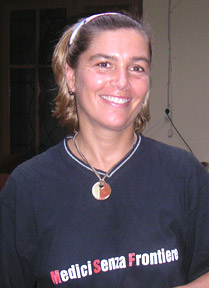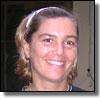Fabienne de Leval, 33, is a psychologist working to coordinate MSF's mental health programs in Bada Aceh, Sigli, and Lamno in Kosovo.
Fabienne de Leval, 33, a psychologist, is coordinating Doctors Without Borders/Médecins Sans Frontières (MSF) mental health programs in Banda Aceh, Sigli and Lamno. De Leval started working for MSF in Kosovo in 1999, training counsellors on post-traumatic stress disorder, and has also worked with MSF in Burkina Faso.
|
– Fabienne de Leval |

|
When did you first arrive in Aceh and what was your role?
I first arrived in Aceh around three months ago in mid March. My role was to define a more long-term strategy now that we were out of the emergency phase. I was to look at the different locations where we were working and develop programs specific to the different contexts. I was also here to support the national and international team and build local capacity. In Aceh there are no clinical psychologists at all and even across Indonesia there are very few. I came here to help develop the ability of communities to meet the overwhelming mental health needs in the face of limited resources.
What mental health activities had MSF been undertaking until then?
MSF was one of the first international nongovernmental organizations to be on the ground in Aceh and from the outset we had trained psychologists accompanying our mobile clinics. That way they could be present during the medical consultations for people who were more in emotional distress. Fortunately, MSF had previous experience of running mental health programs in Indonesia and so had a network of experienced, national psychologists we could call on.
The aftershocks that continued for the first few weeks following the tsunami further increased the panic so as well as accompanying the mobile clinics, we approached community leaders, religious figures, teachers and medical staff and explained to them the cause of the tsunami and these quakes – this was information people were particularly desperate for – and the effect such an event can have on people's behaviour. We taught them how to recognize classic symptoms and the most basic techniques for dealing with these – breathing, relaxation, and so on. And we encouraged them to come to us for more information or for individual counseling.
In these early stages we were working in Banda Aceh, Lamno, Sigli, and Meulaboh. Assessments were also ongoing in 10 other districts.
Are signs of trauma culturally specific or are there some symptoms you find everywhere? How do you address them?
There are definitely certain symptoms of trauma and means to address them that are common to all cultures. The most common ones are headaches, nightmares, flashbacks, and heart palpitations. When earthquakes happen, as they do so often here, people frequently feel a paralysis or numbing of the legs. We even saw this among the international MSF staff.
One of the first things to do following a disaster is to normalize the feelings people are having. People turn to doctors to treat what they think is a physical problem and then become confused when told nothing is wrong. We need to let people know it's not unusual for them to feel these physical symptoms; they are not going crazy. It's a normal reaction to an abnormal situation. We also need to encourage them to talk about their grievances.
Is individual counseling the only way?
Not at all. We also use group discussions and communal activities as a form of therapy. For example, in Lamno our mental health team introduced a boat-building project. We brought together the fishermen of the village and provided them with equipment and materials so they could work together to rebuild their boats. The workshop provided a forum for discussion and it was a great relief for the fisherman to be working towards rebuilding their lives.
How do we know the best way to approach mental health in a situation such as this?
Of course there's no absolute answer but MSF's past experience of running mental health programs is a great resource to draw upon. For many years now we have considered mental health an important consideration in humanitarian interventions and we have subsequently developed expertize and guidelines.
We also rely heavily on our national staff. They speak the same language and share the same culture. They're in a much better position than us to determine what is culturally appropriate.
And we are always open to adjusting our programs as the need arises.
How have the needs evolved over six months and how is MSF adapting to them?
We normally see that immediately after a big disaster the emergency coping mechanisms of people kick in, and with a bit of extra support, most people are able to overcome the initial trauma. In Aceh, immediately after the tsunami, everyone was in shock and emotions were close to the surface so it was easy to get people to talk.
But now emotions are more hidden but there are still many psychosomatic complaints. If not resolved these can become chronic. They're detrimental not just to the individual but to the community as well and can take the form of depression, drug dependency, aggression, and other anti-social behaviour.
To explain the importance of addressing these we sometimes use the metaphor of a wound. You can put a plaster over the wound, which may help for a while, but if you don't clean it properly with disinfectant it can continue to fester. We explain that the disinfectant in this case can be talking.
Now that we're no longer in the emergency phase, it is also important for Aceh to develop its own comprehensive mental health system so that it can meet the needs on its own. The ministry of health has to identify and train psychologists and incorporate them into the health system. We're doing what we can by establishing mental health centers, introducing referral systems and offering training (as well as counseling by our own staff) in all the areas where we run medical programs. Given the number of primary health care centers we support and our outreach activities this is fairly significant.
Do we use any other tools in our programs?
Here in Aceh religion has definitely been a great help to the community. In the Koran there are different prayers (shorats) that can help with the grieving process and these have been used extensively by the people. We don't use prayers ourselves but we have sought the cooperation of religious leaders and asked them to talk to people in the mosques.
Group activities such as singing, cooking and sports are also a form of therapy and release. These help rebuild community ties and keep people busy at a time when they have lost their livelihood and are at a loss as to what to do. They're also traditionally when people in Aceh get together and talk. So we have set up community activities as a part of our mental health programs.
Does MSF use the same approach across Aceh?
No. We're acutely aware that every context is different. Banda Aceh is an urban setting where 60 percent of the town was destroyed and where there is a concentration of nongovernmental organizations. Unlike other areas there is no one single identifiable group – the population in each sub-district is too big – so the community approach that we use in Lamno to the east and in Sigli to the west are not so appropriate. Instead we have concentrated on certain areas where we identified the greatest needs and that were not covered by other organizations.
Lamno was a much smaller and more isolated community, even before the tsunami struck. There, it is much more important to work with the community as a whole and to gain their trust. We've tried very hard to listen to what they themselves say they need most and so far we have concentrated on group activities, as this is what the community is most comfortable with. Once we have their trust it is much easier to then work on the referral system and individual counselling. Community leaders, health staff and teachers have a better understanding of what services we offer and therefore can refer people in need of our support.
In Sigli the setting is different again. In the beginning we had the medical teams working in the sub-districts and certain primary health-care centers so it made sense to use that as a starting point from which to reach out to the communities. These medical programs are ongoing so we continue to attach mental health activities to them as well as extending our approach by developing outreach activities in the communities and villages.
In all areas we are working with children as well as adults and of course this requires different approaches. We are raising awareness among school teachers and parents to alert caretakers to signs of stress. We are also working with orphans.
Is the tsunami the only cause of mental health problems in Aceh?
Not at all. There is no doubt that the conflict has affected people as well.
On an individual level, what have you found to be the greatest challenge?
I think the most exciting thing is that apart from acute mental health where people have severe psychiatric disorders and need to be institutionalized, mental health didn't really exist in Aceh prior to the tsunami. So for me, the greatest challenge is really to be a part of this development of a mental health system in Aceh, to create a system of community based care. But it's going to take time.




